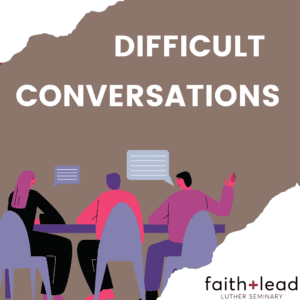Faith+Lead is grateful for this interview with author Catherine McNiel about difficult conversations and her new book Fearing Bravely: Risking Love for Our Neighbors, Strangers and Enemies (The Navigators, Feb 2022).
Faith+Lead: What led to you writing Fearing Bravely, and how do those factors resonate in the lives of church leaders and congregations? How has the COVID-19 pandemic influenced those factors?
Catherine McNiel: That’s an interesting question. I wrote Fearing Bravely entirely during 2020. I started in June and turned it in right after Christmas. While I wrote, my husband and children were “sheltering in place” in the rooms right below me. So, in many ways, Fearing Bravely grew out of our all-too-real pandemic experience.
And yet, on the other hand, I envisioned, proposed, and outlined the book long before the pandemic hit, so COVID wasn’t an inspiration for Fearing Bravely in that sense. Long before the events of 2020, I’d been struck by the deep chasm between Jesus’ teaching on love and fear, and how we Christians actually live and talk; between the way Jesus taught us to care lovingly, sacrificially (and joyfully) for our neighbors, for strangers, and even for enemies … and the profound sense of danger that we adopt when speaking about our neighbors, strangers, and enemies. I wanted to point out this discrepancy and have a conversation about it. Because, as I say in the book, if we’re going to use the name of Christ to describe ourselves, we need to at least consider what he asked of his followers.
Faith+Lead: How do you experience many Christians interpreting who our “enemies” and “neighbors” are these days and how would you have us frame that differently?
Catherine McNiel: I’d like to answer this backwards, starting with a story Jesus told. An expert in religious law asked Jesus how to gain eternal life, but Jesus threw the question back to him. He knew the answer and gave it readily: Love God with all your heart and strength, and love your neighbor as yourself. Jesus confirmed this was correct and said “Do this, and you will live.”
So here, right off the bat, is a teaching that blows our American Christian minds. Love God and love your neighbor is the #1 main thing for God, for followers of Jesus, for eternal life (according to Jesus, anyway). And not just agreeing with Jesus about this but doing it.
And to be honest, this does not look much like what we’re taught God wants, or what it looks like to be a Christian. In my private, individual American life, I hardly know my neighbors. I’ve never even met many of them. So when it comes to following Jesus and loving God, many of us are starting off on the wrong foot from the get-go.
But then the expert asks a follow up question (the same one I’m wondering, actually): Who is my neighbor?
Instead of saying “Anyone in a mile’s walk of your house” or “The ten people in town you know best” Jesus tells a story of a man who was on a dangerous road and was assaulted, robbed, stripped naked and left for dead. The good news is, two different men walked by—both men known for their religious devotion and holy leadership. But they each pass by on the other side.
Then a third man happens by. Based on Jesus’ description, this audience would immediately contrast him with the two godly men we’ve already seen traveling this way, because this third man is a stranger, an enemy, a heretic. Yet he sees the man in need and, even though it’s a dangerous place and situation, undergoes a significant detour to care for him, sacrificing his time, safety, and resources. This is the man—the stranger, the enemy, the heretic—that Jesus says is the neighbor, who follows God, who gains eternal life.
Those were seriously provocative fighting words back then. And honestly, they are to us as well.
Going back to your original question: Unlike Jesus, I think we tend to give ourselves a pass on taking care of neighbors and (especially) strangers because we’ve been warned they might be dangerous. They might be enemies. Like the two holy men in the story, we see danger and inconvenience and so we follow the safer road. That even feels like the good, Christian thing to do, most times.
But Jesus makes it pretty simple for us:
- According to the Son of God, our two priorities are to love God and love our neighbors.
- And by neighbors, he means anyone in need. Even if they are strangers. Even if it’s dangerous. Even if they are enemies.
This is hard to live into day by day, for sure. It takes a life of practice, and we have to do it together. But because neighbors and enemies are all in one package, it takes the guesswork out. Whomever this person before me is, my job is to love them.
(By the way, this doesn’t mean go meet your abusive ex-husband for coffee, or have your gaslighter over for Thanksgiving, and I go into detail on this in the book.)
Faith+Lead: How can churches address fears that stir up hatred, in order to have constructive and open conversation about them? How can church leaders raise valid criticism of “Christian” behaviors that have gone awry without the conversation exploding?
Catherine McNiel: Ah, this is such a deep question. Our very-real fears, not to mention life with our very-real neighbors, strangers, and enemies, are not easy to explore or wrestle with. We hold these things so close to our identity and sense of self and safety. But these are the deep, difficult conversations the church must be having if we are going to make any attempt to be followers of Jesus.
This all has to be part of a larger spiritual formation process. Are we training to keep our eyes on Jesus, day after day? Are we learning to recognize God’s voice and how it calls to us differently than our fears? Are we learning to see God as a loving parent—not abusive and angry—full of compassion, mercy, love, and grace (as God has introduced Godself to us all the way back in Exodus)?
We need to begin by realizing that we are loved. That our fellow church leaders are loved. That if we’ve gotten things very, very wrong, it is God’s kindness that leads us to repentance. We have to stop dunking on each other. But we have to stop letting our fears disciple us into hatred and neglect and calling that “Christianity” too.
Faith+Lead: How are books like yours best used to open difficult conversations without reverting to defensiveness?
Catherine McNiel: I worked very hard to explore this very difficult topic with an invitational voice, and I think you’ll see that in Fearing Bravely. Our defensiveness is rooted in fear. We can’t begin choosing love over fear by leading with fear! This book is about God’s love from beginning to end. God’s grace and mercy and compassion and second chances. God smiling on us. God inviting us. God welcoming us. There’s nothing we can do to earn or lose this love that is everything. It simply is.
So, what will we do in response? Will we obey this God of love and follow Jesus? Fearing Bravely invites us to look at ourselves, and look at the teachings of the Bible, and honestly ask that question. It includes discussion and reflection questions at the end of each section, as well as practical steps that you can take on your own or with a group, because following Jesus isn’t something we do in our heads. It’s something we do with our bodies, together.
Reader, I would be so honored to hear what you find in these pages. Let’s have these difficult conversations together.
Check out Faith+Lead’s other author interviews:
Liberating Love: An Interview with Sandhya Jha
Addressing Grief, Loss and Anxiety: An Interview with Jennifer Grant
Inclusive Youth Ministry: An Interview with Author Ross Murray




